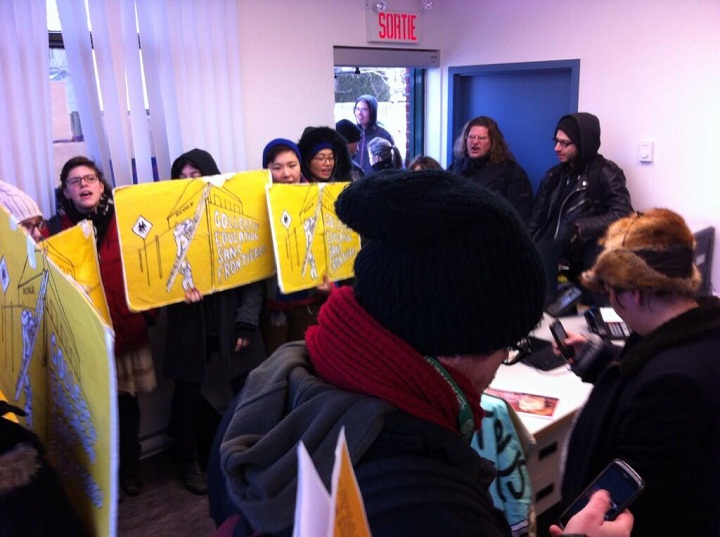LONGUEUIL – On International Human Rights Day, protesters occupied the offices of Quebec’s Education Minister for several hours on Tuesday in order to raise awareness of the plight of non-status children in Quebec.

Unlike in countries like the U.S., U.K., France, or even in Canadian cities like Toronto, all of which offer free primary and secondary education to all children, regardless of their immigration status, non-status children in Quebec are not allowed to attend public school in the province, or are charged up to $6,000 in fees for the privilege.
“Non-status people are our co-workers, neighbours, friends, it’s almost impossible to live in a city like Montreal and not know someone who is living without status,” said Darwish.
“We had about 40 people in the office this morning,” Amy Darwish, a spokesperson for Collectif éducation sans frontières told Global News on Tuesday before noon.
“We are planning to stay until we receive a clear commitment from the minister that she will create a special back-to-school provision that will allow non-status children to register for school in January.”
The Collectif éducation sans frontières (collective for education for all) was formed as part of the activist group, Solidarity Across Borders, a migrant justice network based in Montreal that supports “individuals and families who are confronting an unjust immigration and refugee system.”
“Undocumented families live very precarious lives and there have been cases where people have been reported to immigration when they’ve tried to access health and social services,” said Darwish.
“Education is a right and is accessible to everyone, irrespective of their immigration status.”
It’s a statement that echoes the words of Nelson Mandela’s infamous quote, “education is the most powerful weapon which you can use to change the world.” Coincidentally, his memorial service was held in FNB stadium near Soweto was held on Tuesday.
- Alberta to overhaul municipal rules to include sweeping new powers, municipal political parties
- Canada, U.S., U.K. lay additional sanctions on Iran over attack on Israel
- TikTok vows to sue over potential U.S. ban. What’s the legal outlook?
- No more ‘bonjour-hi’? Montreal mayor calls for French only greetings
In 2007, Education International, which represents organizations of teachers and other education employees around the world, published a report on the education of non-status children.
Commissioned after the World Congress expressed concern over children’s education when families are uprooted or in exile, it confirmed that the legal systems of countries within the Organisation for Economic Co-operation and Development (OECD) were supposed to ensure access to compulsory primary and secondary education for all children under a certain age, regardless of the child’s national background or legal status.
Although Canada has been a member of the OECD since 1961, Quebec is not the only place where non-status children face educational uncertainty.
“In some contexts there is a lack of access to education, and in some cases migrant children are even denied the right to education, or receive an education of lower quality,” the report noted.
Although the Montreal collective has been working for over a year and a half to help non-status children have free access to schools in Quebec, those fighting for the rights of non-status children in the province have been frustrated by a perceived lack of response from the Ministry of Education.
“She has refused to act on this injustice, and even refuses to engage our Collective or the mainstream media on this issue. The only way to get her attention, and force her to act, is through this occupation,” a member of the collective, Nicolas Quiazua, said in a statement.
The allegation is strongly denied by the Parti Quebecois.
“We have done many things,” Mathieu Le Blanc, the press secretary to Minister Malavoy told Radio-Canada.
“If these measures are not sufficient, we will see what other legal steps can be taken,” he added.
Protesters said earlier in the day that they were prepared to continue to occupy the Minister’s offices until changes were made.
“We are willing to risk arrest and trial to make our point, especially since the Minister seems incapable of responding otherwise,” said Quiazua.
However, just before 2 pm, protesters left the site in Longueuil. Organizers told Global News that they were satisfied with the results of the protest.





Comments